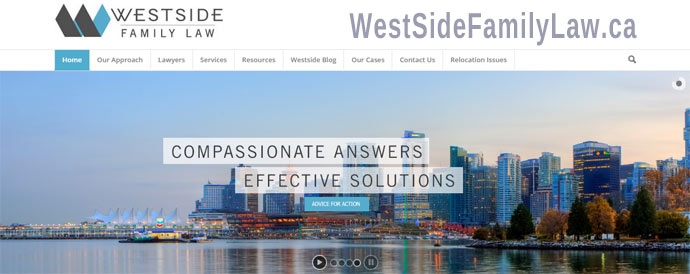
WHY HAVE A MARRIAGE OR COHABITATION AGREEMENT?
Article: by Jessica England, LLB, & Anna Perry, LLB, Vancouver family law lawyers PerryLawBC.com
BC common law couples and married spouses have the ability to opt-out of the Family Law Act - new family law legislation in BC - and dictate the terms of their future possible separation that work well for them by entering into a Marriage or Cohabitation Agreement at the beginning of their relationship.
There are many reasons that a couple may decide to get a marriage or cohabitation agreement. In particular, I would strongly encourage anyone who is about to get married or enter into a common law relationship to consult a lawyer regarding an agreement if they are in one of the following situations:
-
they have substantial assets, whereas the other party does not
- they have children from a previous relationship
- they own a business or have a professional practice
- they would like to maintain separate financial affairs and remain independent and self-sufficient
- in the case of a cohabiting couple or a couple moving in together, a situation where the potential client does not want to take on, at least at this time, the commitment and obligations that the new Family Law Act imposes on common law couples
- they are making a financial or career-related sacrifice in order to marry or be in the relationship
Having an agreement in place at the beginning of the relationship drastically cuts down on the potential expense, stress and uncertainty inherent in separation, and allows the parties to maintain their privacy. The Courts generally strive to uphold agreements between parties, provided that the parties make full disclosure of their financial situation, were not subject to any stress or pressure to sign the agreement, and provided that the provisions made in the agreement are not extremely unreasonable or unconscionable.
Couples who take advantage of the opportunity to agree in advance on how assets would be divided in the event of separation give themselves a measure a certainty and peace of mind that allow them to focus on the marriage or relationship instead of worrying about the consequences of relationship breakdown. In the event that a relationship does end, or where a party is contemplating bringing an end to the relationship, an agreement provides general guideline of what their financial future holds, which provides a welcome measure of certainty and comfort in a turbulent time.
Reasons to have a marriage and cohabitation agreements
Couples enter into different kinds of marriage and cohabitation agreements for different reasons. Each agreement is specific to the needs and wishes of the couple, and some are quite simple, while others are more detailed or more complex. In some cases, one or both parties simply wish to protect assets accumulated before the relationship, but would like to move forward in the relationship pooling their income and acquiring assets together. In other cases, a party might wish to protect assets such as property embroiled in expensive and troublesome litigation in the future. Some parties may wish to have both separate and joint assets throughout their relationship, or may wish to preserve certain items that have sentimental value to them.
Many couples who are well-established in their lives and careers already, particularly if they have children from a previous relationship, choose to maintain separate financial affairs throughout their relationship. In the latter case, the parties may wish to specify how the parties would each contribute to the amenities and resources that they share. Spousal support is also an issue that may or may not be addressed by the parties to the agreement. There are as many different agreements as there are couples, with each couple expressing different needs and expectations.
Authors of above article on marriage/cohabitation agreements
Jessica England, Barrister & Solicitor Vancouver author of article above - is in 2013 a new content contributor to CanadaLegal.info
JESSICA ENGLAND - Practice background
Jessica practices in all BC family law areas including custody, access, support and division of assets in Supreme Court, Court of Appeal and Provincial Court files in addition to her non-litigation files involving negotiation and preparation of family law Agreements for separation, cohabitation, parenting and co-ownership of property. Jessica's files involve both collaborative negotiations and litigations of issues of support, custody, guardianship, marriage, separation and divorce with property division issues under the BC family law in the Divorce Act, Family Relations Act, Law and Equity Act and the Land (Spouse) Protection Act of BC.
Jessica is well known for her practical and reasoned approach to resolving cohabitation, separation and divorce disputes. Most particularly, the new Family Law Act in BC will change family law in BC in March 2013 and Jessica has prepared new template cohabitation and separation agreements for the new Act's changed law.
FOR A CONSULTATION WITH JESSICA:
Telephone: 604-734-7911
Web site: WestSideFamilyLaw.ca
Recent court room decision: Yu v. Jordan, 2012 BCCA-Court of Appeal of British Columbia.
|
Copyright © 2001-2013 Mark G. Perry Law Corp. dba “Westside Family Law”. All rights reserved other than as authorized by licence.
|
HOW TO WRITE AN AFFIDAVIT FOR A FAMILY LAW CASE
by Jill Chapin, BA LLB
PerryLawBC.com
Vancouver BC
One of the easiest ways for a family law file to slip from "engaging in settlement discussions" to "high conflict litigation is when one party files an application supported by an inflammatory affidavit. The party "receiving the affidavit is embarrassed, shocked and horrified - it makes them sound like a terrible person, it may contain exaggerations or allude to things that are not true, and it is a sworn document. There is a temptation to create a responding affidavit written in the same tone, with similar one-sided versions of the facts, "fighting fire with fire" so to speak.
This creates two problems. First, a judge or master reviewing the application materials is left with two affidavits that are likely to contain a variety of legally inappropriate content and which may obscure or confuse the relevant parts of the "story". Second, a war of affidavits between parties can seriously damage relationships between two people who are attempting to work as co-parents or disentangle themselves financially by misconstruing innocent events or conversation and breaking already compromised trust.
The first thing a litigant who receives an "angry affidavit" should understand is that they are not the first person ever to receive one nor is it the first time a presiding judge or master has ever read one.
The second thing a litigant who receives an "angry affidavit" should understand is that many of the most antagonistic parts of the affidavit may actually be legally inappropriate and that judges and masters are typically aware of what is legally inappropriate and do not use it to make decisions. In fact, many members of the judiciary have condemned this kind of supporting material in their decisions and rather than assisting in winning an application the wrong content and tone in an affidavit can do a great deal to distract from valid, legally relevant facts. Affidavits are meant to be about facts - not assumptions, feelings or speculative diagnoses of the deficiencies of a former partner.
For example: "On January 8th, 16th, 24th, and 30th the Respondent did not return the children at the scheduled drop off point" are facts that you can swear to if you know them to be true. The conclusion that this is "because the Respondent does not care about the children's safety and is a reckless and negligent parent" is not fact, and is inappropriate and unhelpful in affidavit materials.
Although they often read as "stories", a lawyer can interview you to gather the legally relevant facts, making sure they are clearly communicated in accordance with the law in the most effective format and tone. A lawyer can also help you "interpret" what may be driving certain parts of an affidavit you receive - why the other side is bringing up particular events or facts and if there is a likely strategy behind what has been written. If the affidavit makes baseless accusations, a lawyer will explain to you what kind of evidence the court can use to dismiss those accusations and how you might be able to submit it with your response as there are strict rules about what is filed in court. A balanced, concise, non-inflammatory affidavit serves a dual purpose - it adds to your credibility as a litigant in front of the courts and it assists in moderating conflict on your file by avoiding "fueling the fire" with more emotionally loaded content that should not be part of the process.
What if I Swore Something Wrong? Errors and Affidavits
Although everyone wishes it didn't happen, it sometimes does: an affidavit is sworn and filed and the party who signs it realizes that, for whatever reason, they got something wrong. The worst place for an error to be pointed out is in court where a pointed question is asked or evidence contradicting what was sworn is produced and it becomes clear, for the first time, that something is not right.
Sometimes, as in James v. Male, 2011 BCCA 81, the error is not “material” and won't impact the outcome. In that case, it was a particular typographical error on an affidavit of service. However, some ‘minor’: errors such as dates can be very material to what the court is trying to decide and it's best to get advice on how a mistake will impact things - and in some cases, try to fix it.
Lawyers have a duty to advise the court if they know there are errors or inaccuracies in an affidavit and to ensure what is sworn is true as far as they have been informed (See, for example, Hart (Re), 2007 LSBC 50 (CanLII)). One of the ways counsel can inform the court of an error is to file material correcting and explaining errors how errors were made, if necessary, but it's generally better to take steps to avoid factual errors at all.
One of the best ways to guard against affidavit error is to be prepared. For example, providing all documents requested by a lawyer in a timely fashion helps them draft skeleton materials where dates, names and numbers are already verified and they can interview you to fill in timelines or for more information about specific events, focusing your attention. It is important for your counsel to know if you’ve sworn any statements before so they can discover and question any contradictions, especially where a conflict has a long and complex history. Planning enough time when setting or responding an application to review materials before the day they are signed is also very useful.
Another way to prepare is to think about how you best communicate and to use your own strengths and balance your own weaknesses - if you're highly emotional, it may be a good idea to condense some facts in writing before an interview so you can think more clearly and stay on track; if you have a poor memory generally, try recording things in a journal so that you can be specific about when and in what order things happened. Even police officers, who are trained to recognize important facts so that they can be witnesses, take and review notes before and during legal proceedings. If you have trouble focusing or deciding what’s relevant, counsel can provide you with a series of questions that help set out key facts. Gathering information is imperfect and often a combination of strategies tailored to the issue and the client, and great affidavits are typically a result of combined efforts by client and counsel.

Jill Chapin
Family lawyer with WestSideFamilyLaw.ca
Click to article on Preparing Affidavits for Family Law Court Case
Copyright © 2001-2013 Mark G. Perry Law Corp. dba “Westside Family Law”. All rights reserved other than as authorized by licence.
******************
Twenty Questions to Ask - Before You Hire a Lawyer
An excellent Checklist for someone to use in selecting a lawyer, has been prepared by the publishers of
www.lawyers-bc.com/tips.htm. You will find these guidelines useful for not just Employment Lawyers but other types of lawyers special services also.
Family Law as a Preferred Area of Practice
The Law Society of BC has lawyers who have stated
a particular "preferred area of practice"
Employment Law is one of these P.A.P's.
Not all lawyers who advertise in: telephone directories; on the Web or in magazines have
stated their Preferred Area of Practice with the Law Society of BC directory.
Web site Disclaimer
This site lists lawyers with areas of practice including Canada Citizenship and Immigration / Refugee Law - we advise you to verify if the lawyer is still maintaining their membership with the Law Society of BC by going to www.lawsociety.bc.ca as lawyers move or change areas of specialization over time.
The intent of this web-site is to provide "starting points" for people looking for sources of legal information and specialists. Information on this web site is not to be seen as legal advice -- for that you directly consult a lawyer.
This site is not endorsed by web sites to which it provides links to, unless otherwise noted, where a particular lawyer has volunteered to become a content contributor.
Credits
Photo of Ottawa's Parliament Buildings from Adrienne S. Chan, Ph.D, a Vancouver based
consultant in diversity/ anti-racism/ multiculturalism
training, research, organizational development, program development and review.
See www.GetDiversity.com
Errors or Omissions
If any lawyer-firm notes that we have made an error or omission in our mention of them on this web site, please send us
email with the appropriate information.
|



